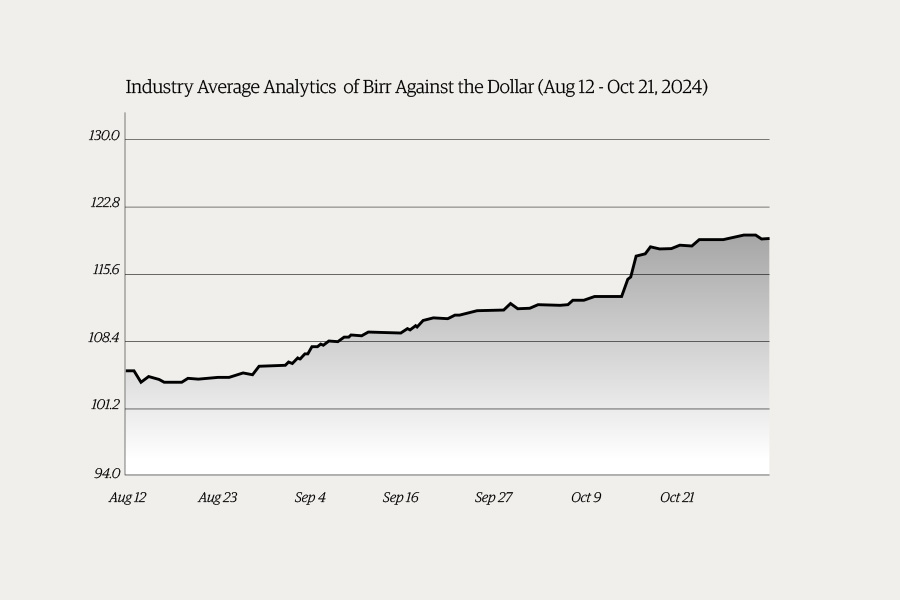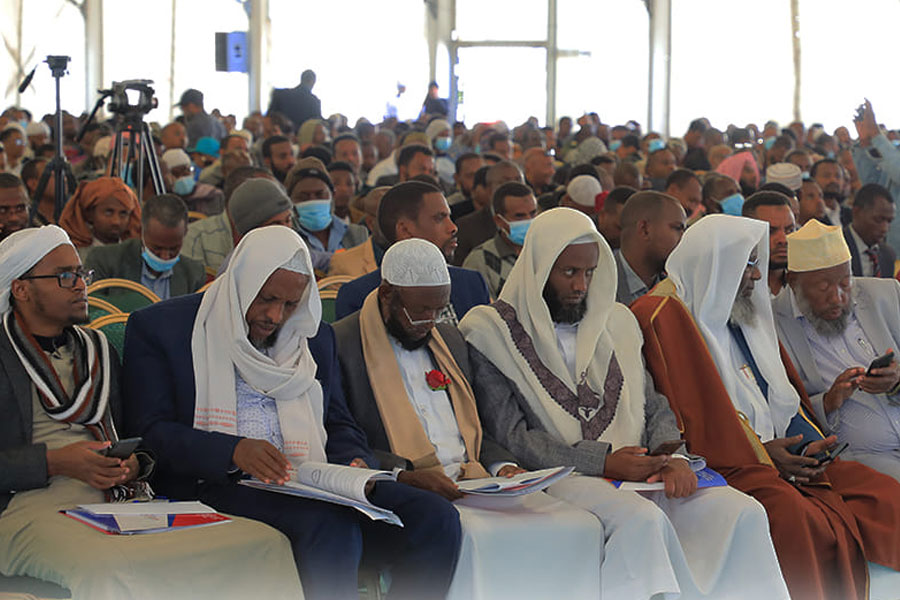
Fortune News | Jun 21,2025
Hijra Bank has overcome its founding year losses, marking a notable turnaround in the nascent interest-free banking industry. The Bank reported a net profit of 27.8 million Br in its 2022/23 operation year, which tells a robust recovery and places it ahead of its competitor, ZamZam Bank, by 3.7 million Br. The achievement is particularly notable considering ZamZam's one-year lead in the market.
Industry observers saw Hijra's tough beginning during its inception and profitability as a cue to the potential of Sharia-compliant banking models. They believe Hijra Bank's financial performance and strategic decisions manifest a broader trend in the banking industry, where interest-free banking gradually carves out a niche. Its successful rebound from an initial loss to a profitable position within a relatively short time illustrated the potential for Islamic banking in a diverse and evolving financial sector.
Hijira Bank's success is underpinned by a considerable surge in all income streams—financing and investment income, fees and commissions, and other operating income. However, the result came with its set of challenges, including a marked rise in operational costs due to an aggressive expansion strategy. Over the year, Hijra Bank opened 31 new branches, bringing its total to 71.
A driving factor in Hijra's revenue boost was the substantial increase in financing and investment income, which soared to 336.68 million Br, powered mainly by a significant supply of Murabaha financing—a sales contract arrangement common in Islamic banking. This figure was shy of ZamZam's 337.57 million Br but marked a dramatic increase from Hijra's previous year's income of 19.1 million Br. Income from fees and commissions jumped to 66.9 million Br from 7.44 million Br, and other operating income increased to 19.46 million Br from 1.04 million Br.
Despite the income boosts, Hijra Bank also saw its expenses skyrocket, mainly due to its expansion efforts and a surge in wages and operational costs. Wages and staff benefit alone climbed by 128.5pc to 222.45 million Br, while other operating expenses surged by 134.5pc to 161.6 million Br. Despite these increases, Hijra's spending remained 73.15 million Br lower than ZamZam's, which reported 295.96 million Br in expenses.
At a shareholders meeting held at the Millenium Hall back in December, Abduselam Kemal, Hijra’s Board Chairman, outlined ambitious plans for further branch expansion and considerable investments in digital banking. He told shareholders the aim is to improve service accessibility and foster a deeper penetration of interest-free banking services across Ethiopia. In a vote of confidence from the shareholders, the Bank announced plans to increase its paid-up capital to six billion Birr over the coming years from the current 1.27 billion Br.
Hijra was incorporated three years ago with a subscribed capital of 1.3 billion Br.
According to Dawit Qeno, Hijra Bank's founding president, his Bank overcame numerous obstacles, such as a lack of skilled workforce, limited social awareness of Islamic banking, unhealthy competition, and a difficult economic environment. Despite these challenges, Dawit remains upbeat about the Bank’s potential to distribute dividends to its shareholders as it consolidates its position in the banking industry.
London-based financial analyst Abdulmenan Mohammed (PhD) praised the Bank's performance, urging patience among shareholders for returns as the Bank works to recover from a 123.8 million Br loss of the preceding year. He attributed the turnaround in profit to efficient resource utilisation, particularly as new entrants in the financial sector face inevitable soaring expenses.
"Executives should work hard to shorten the loss recovery period," he said.
Dawit, the Bank's president, concurred.
"We're aggressively working to reverse previous losses," he told Fortune.
Dawit is an alumnus of Addis Abeba University and former vice president for resource and credit management at the state-owned Commercial Bank of Ethiopia (CBE). He took over the top position at Hijira Bank two years ago, steering it through a demanding operating environment marked by low awareness about interest-free banking, the effects of political instability on customer activities, and the Central Bank's 14pc credit cap loom.
He stated inflation and foreign currency shortages were setbacks that Hijra overcame. However, he is optimistic about Hijra's capability to pay dividends to shareholders as it further solidifies its place in the sector. The Bank’s strategic location and the optimism of its management and shareholders promise a bullish year ahead.
Hijra Bank’s total assets increased significantly by 178.4pc to 6.18 billion Br. It disbursed Murabaha financing worth three billion Birr, marking an exceptional 850pc increase from the previous year.
"It is impressive growth," Abdulmenan lauded.
The aggressive growth strategy also included beefing up its Mudaraba investment, which stood at 400 million Br in the preceding period. According to Abdulmenan, the Bank's ability to mobilise savings, which surged by 263.9pc to 4.84 billion Br, clearly indicated growing customer trust and the successful appeal of its interest-free banking model.
Despite this, its financing-to-savings ratio, a key performance indicator, stood at 62pc, significantly lower than commercial banks, presenting an area for improvement. According to Abdulmenan, Hijra Bank needs to work forcefully to improve this performance.
"We're working on disbursing what we mobilised," said Dawit.
Hijra Bank's liquidity metrics show a healthy position. Cash and bank balances increased to 2.4 billion Br, representing 38.8pc of its total assets and 48.1pc of its total liabilities. The liquidity level is considerably higher than that of ZamZam, alongside a robust capital adequacy ratio (CAR) of 38.6pc, well above the regulatory minimum of eight percent and the 26.7pc average for the 16 top private commercial banks.
Ali Mohammed, one of Hijra Bank's 9,000 founding shareholders, with 1.3 million Br in shares, echoed a sentiment of patience and long-term vision. He stated that dividends might take time as the Bank recovers from its initial operating loss and navigates the regulatory and economic environment. His faith in the Bank's growth trajectory, despite regulatory caps on credit growth, illustrated a shared optimism among shareholders about Hijira Bank's future profitability and its role in expanding the reach of Sharia-compliant financial services in the market.
"Perhaps next year there will be dividends," he told Fortune.
The Bank's strategic initiatives, particularly its investment in digital banking solutions to enhance customer accessibility and service efficiency, further enlivened optimism. Abdulmenan urged the executives to use the liquid resources for multiple income-generating activities over the coming years.
Ali Hassen, manager of Hijra's Ehilberenda Branch, acknowledged that operating in a market afflicted by political instability and economic turmoil remains a concern. However, he remains buoyant in the strategic locations of branches, especially in regions with significant Muslim demography, which is seen as a key advantage.
"Our branch benefits from its strategic location," he told Fortune.
According to Abdulmeman, such moves are vital for Hijra Bank as it seeks to consolidate its market presence and compete effectively with conventional and interest-free banking institutions.
PUBLISHED ON
Mar 23,2024 [ VOL
24 , NO
1247]

Fortune News | Jun 21,2025

Radar | Jul 23,2022

Fortune News | Mar 07,2020

Money Market Watch | Nov 03,2024

My Opinion | Feb 27,2021

Viewpoints | Dec 15,2024

Radar | Jun 29,2025

News Analysis | Jul 01,2023

Fortune News | Aug 05,2023

Commentaries | Aug 08,2020

Dec 22 , 2024 . By TIZITA SHEWAFERAW
Charged with transforming colossal state-owned enterprises into modern and competitiv...

Aug 18 , 2024 . By AKSAH ITALO
Although predictable Yonas Zerihun's job in the ride-hailing service is not immune to...

Jul 28 , 2024 . By TIZITA SHEWAFERAW
Unhabitual, perhaps too many, Samuel Gebreyohannes, 38, used to occasionally enjoy a couple of beers at breakfast. However, he recently swit...

Jul 13 , 2024 . By AKSAH ITALO
Investors who rely on tractors, trucks, and field vehicles for commuting, transporting commodities, and f...

Jul 5 , 2025
Six years ago, Ethiopia was the darling of international liberal commentators. A year...

Jun 28 , 2025
Meseret Damtie, the assertive auditor general, has never been shy about naming names...

Jun 21 , 2025
A well-worn adage says, “Budget is not destiny, but it is direction.” Examining t...

Jun 14 , 2025
Yet again, the Horn of Africa is bracing for trouble. A region already frayed by wars...